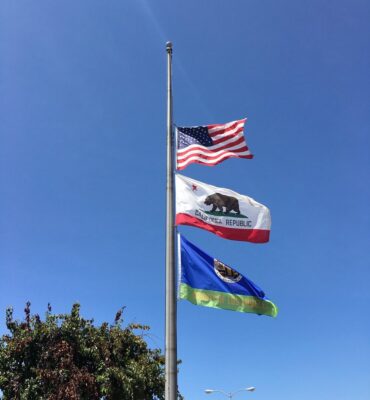By Tom Ozimek
Contributing Writer
The U.S. Air Force has agreed to provide military funeral honors for Ashli Babbitt, the Air Force veteran shot and killed during the Jan. 6, 2021, Capitol breach, reversing a 2021 decision that denied her family’s request, according to a letter from an Air Force official made public by a legal group.
The Aug. 15 letter from Air Force Undersecretary Matthew Lohmeier was released on Wednesday by Judicial Watch, a conservative legal group that has represented Babbitt’s family in court. In the letter, Lohmeier wrote that the service erred in its earlier denial and that, upon further review of the case, Babbitt would be eligible for funeral honors.
“I understand that the family’s initial request was denied by Air Force leadership in a letter dated Feb. 9, 2021,” Lohmeier wrote. “However, after reviewing the circumstances of Ashli’s death, and considering the information that has come forward since then, I am persuaded that the previous determination was incorrect.”
The letter offers Babbitt’s mother, Machelle Witthoeft, and her husband, Aaron Babbitt, the option to proceed with funeral honors and extends an invitation to meet with Lohmeier at the Pentagon, where he wishes to personally convey condolences.
The Air Force and the Pentagon did not immediately respond to requests for confirmation of the letter’s authenticity or comment on the decision.
Reversal of Earlier Denial
Babbitt, 35, was shot and killed by U.S. Capitol Police Lt. Michael Byrd as she attempted to climb through a broken door window leading to the Speaker’s Lobby near the House chamber on Jan. 6, 2021. She was among a crowd protesting the certification of President Joe Biden’s electoral victory. Babbitt was shot in the shoulder and pronounced dead about an hour later at a Washington hospital.
About a month later, then-Air Force personnel chief Lt. Gen. Brian Kelly informed Babbitt’s family that funeral honors were denied because of Babbitt’s actions at the Capitol. In the Feb. 9, 2021, letter, Kelly wrote to Babbitt’s husband that military funeral honors “have been denied for the funeral of your wife due to the circumstances preceding her death,” adding that a military funeral would “bring discredit” upon the Air Force.
Funeral honors are traditionally offered to veterans who were discharged under conditions other than dishonorable. The detail typically includes at least two uniformed service members, one of whom represents the veteran’s branch. The ceremony involves the playing of taps and the folding and presentation of the American flag to the next of kin.
Judicial Watch President Tom Fitton praised the Air Force’s reversal in a statement, crediting the Trump administration for the decision.
“Ashli Babbitt’s family is grateful to President [Donald] Trump, Secretary [Pete] Hegseth and Under Secretary Lohmeier for reversing the Biden Defense Department’s cruel decision to deny Ashli funeral honors as a distinguished veteran of the Air Force,” Fitton said in a statement.
Wrongful Death Lawsuit
The group has also taken up litigation on behalf of the family. Last year, Judicial Watch filed a $30 million wrongful death lawsuit in federal court in San Diego, accusing Byrd of negligence in his use of deadly force. The complaint alleges Babbitt was unarmed, posed no threat, and was not given a warning before she was shot.
Both the U.S. Capitol Police and Byrd’s attorney have previously defended his actions, saying he acted lawfully and in defense of lawmakers being evacuated from the House chamber. Byrd, now a captain, was cleared of criminal wrongdoing in 2021 after an internal review.
Byrd said in an interview on NBC that he believes his actions that day “saved countless lives,” adding that he was convinced that “members of Congress, as well as my fellow officers and staff, were in jeopardy and in serious danger.”
The Air Force’s reversal of the denial of military funeral honors comes months after the federal government agreed to pay nearly $5 million to Babbitt’s family in a settlement over her death, though that agreement did not resolve the separate wrongful death lawsuit.









